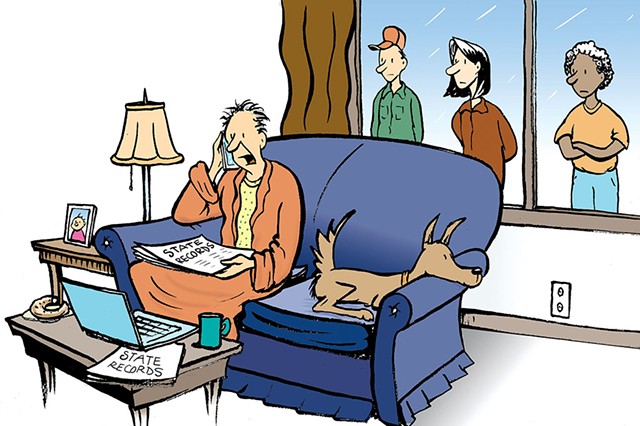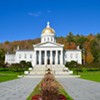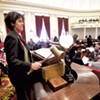Switch to the mobile version of this page.
Vermont's Independent Voice
- News
- Arts+Culture
- Home+Design
- Food
- Cannabis
- Music
- On Screen
- Events
- Jobs
- Obituaries
- Classifieds
- Personals
Browse News
Departments
-
Housing Crisis

'We're Leaving': Winooski's Bargain Real Estate Attracted…
-
City

Aggressive Behavior, Increased Drug Use at Burlington's…
-
Environment

An Act 250 Bill Would Fast-Track Approval…
- Through Arts Such as Weaving, Older Vermonters Reflect on Their Lives and Losses This Old State 0
- High School Snowboarder's Nonprofit Pitch Wins Her Free Tuition at UVM True 802 0
- From the Deputy Publisher: Winooski, My Town? From the Publisher 0
Browse Arts + Culture
View All
local resources
Browse Food + Drink
View All
Browse Cannabis
View All
-
Culture

'Cannasations' Podcaster Kris Brown Aims to 'Humanize'…
-
True 802

A Burlington Cannabis Shop Plans to Host…
-
Business

Judge Tosses Burlington Cannabiz Owner's Lawsuit
-
Health + Fitness

Vermont's Cannabis Nurse Hotline Answers Health Questions…
-
Business

Waterbury Couple Buy Rare Vermont Cannabis License
Browse Music
View All
Browse On Screen
Browse Events
Browse Classifieds
Browse Personals
-

If you're looking for "I Spys," dating or LTRs, this is your scene.
View Profiles
Special Reports
Pubs+More
Public Officials, Private Accounts: Court Says Documents Stay Public
Published October 25, 2017 at 10:00 a.m. | Updated October 25, 2017 at 5:14 p.m.
A Seven Days inquiry has found that some Vermont public officials routinely conduct government business on private phone and email accounts. Public records requests sent to 18 local and state officials last month showed that some rely exclusively on their personal accounts.
Last Friday, the Vermont Supreme Court ruled that those accounts are subject to the state's Public Records Act. Transparency advocates celebrated the justices' unanimous ruling, which reversed a lower court decision. In light of Seven Days' finding, the high court's action affirms the public's right of access to government communications that are taking place through unofficial channels.
American Civil Liberties Union of Vermont attorney Lia Ernst called it "a major win for all who care about government transparency and accountability." But, she noted, "public officials — and the public — are best served when public business is done on public accounts."
The debate over what's private and what's public came to the fore locally in 2016, when lawyer Brady Toensing, vice chair of the Vermont Republican Party, sued then-attorney general Bill Sorrell, a Democrat, for refusing to search a private email account for messages exchanged with lobbyists. Siding with Sorrell, Vermont Superior Court Judge Robert Mello ruled last February that those private accounts weren't subject to the state's public records law.
After Toensing appealed, the Attorney General's Office, now led by T.J. Donovan, moderated its stance, no longer insisting that private accounts were entirely exempt from the public records act. Instead, it argued that officials didn't have to search their private accounts in response to public records requests unless the requester could demonstrate that such documents existed. Donovan's argument hinged on the assumption that officials are unlikely to use their personal accounts for public business.
To test that assumption, Seven Days sent a slew of public records requests to government officials in September — after Mello's ruling but before last week's Supreme Court decision. They included three local officials, six legislators, three statewide officeholders and six state employees working under Gov. Phil Scott. Seven Days asked for all communications relating to public business that were sent or received on their personal accounts during a two-week period last month.
Only Alburgh Selectboard chair Tyler Gotshall refused our request outright, citing Mello's ruling. Ten officials, including Donovan, acquiesced with a caveat: They said they were providing the records as a courtesy, not because they were legally obligated. Others handed over their records without any qualifications.
Sixteen of the 17 officials who complied with our request had documents relating to government business on their private accounts. In most cases, the communications were mundane — an email to arrange a meeting or a text to say someone was running late.
But the records revealed that people at the highest level of state government have consequential discussions with one another through private channels. Officials said they use personal accounts either inadvertently or out of a desire for convenience, not secrecy. Motives aside, they do it all the time.
Mental Health Commissioner Melissa Bailey texted her boss, Secretary of Human Services Al Gobeille, on his personal phone as they scrambled one evening to find a hospital bed for a psychiatric patient.
Senate President Pro Tempore Tim Ashe (D/P-Chittenden) used his personal email account to contact the Agency of Agriculture, Food & Markets about a controversy surrounding a Charlotte hops farm. He had questions about the regulation of pesticides and herbicides.
Also via personal email, Lt. Gov. David Zuckerman asked members of the Vermont congressional delegation for an update on hurricane-struck Puerto Rico.
Colchester Selectboard chair Nadine Scibek used her personal email to communicate with the town manager about a controversy over plowing private roads. They exchanged drafts of a document answering residents' frequently asked questions about plowing policy.
Had the Supreme Court not struck it down, Mello's decision would have cut off the public's right of access to all of this information, and more.
Vermont law doesn't prohibit the use of personal accounts for official work, but the practice is generally frowned upon because of security concerns and the importance of preserving public records.
"Employees with state email accounts shall not routinely use personal email accounts to conduct state business," reads the Personnel Policies and Procedures Manual, which applies to all state employees.
Rep. Maida Townsend (D-South Burlington), who chairs the House Government Operations Committee, said lawmakers are "encouraged as much as possible to do all of our state-related business on our legislative accounts." The Vermont League of Cities and Towns makes the same recommendation to municipal officials.
But quarantining the personal from the public can be tricky, and most officials said they occasionally slip up and send something from the wrong account. Even those most disciplined about using their government email can't prevent others from sending messages to their personal accounts. Some officials' email addresses and numbers were widely distributed before they took government posts.
"What are you gonna do, rent a blimp and have an advertising campaign [to say] 'Don't email me'?" asked Gobeille, who was a well-known restaurateur long before he took a public job.
The VLCT recommends that officials forward emails about government business received in their private accounts to an official one before responding. What about the public servants — primarily at the local level — whose posts don't come with an official email account? The VLCT advises those individuals to create separate accounts for government business.
Phones present more of a challenge. Juggling both a personal and a state-issued cellphone has been a "nightmare," Gobeille said. "I've been trying to migrate people over to my state phone. I'm probably 85 percent there." (This reporter only had his personal number and reached him that way.)
Others have decided not to bother with the hassle of maintaining multiple devices. Zuckerman relies exclusively on his personal phone. Secretary of State Jim Condos said he also uses his own phone. None of the 180 state lawmakers are issued cellphones. Local government officials are even less likely to receive such devices.
A number of state officials told Seven Days that they had always assumed texts and emails concerning government business and exchanged on their private accounts were public documents.
"I do think that no matter whether it's our private email or a state email, if I am conducting business as a state official, that should be public record," said House Speaker Mitzi Johnson (D-South Hero.)
"If it's public, it's public, regardless of where it lives," said Sen. Jeanette White (D-Windham), who chairs the Senate Government Operations Committee.
After last Friday's ruling, every Vermont official, from the Alburgh Selectboard chair to the attorney general, will have no choice but to follow that standard.
Related Stories
Got something to say?
Send a letter to the editor
and we'll publish your feedback in print!
More By This Author
About The Author

Alicia Freese
Bio:
Alicia Freese was a Seven Days staff writer from 2014 through 2018.
Alicia Freese was a Seven Days staff writer from 2014 through 2018.
Speaking of...
-

Prison Contractor Subject to Public Records Act, Supreme Court Rules
Sep 7, 2021 -

After Failed Merger Votes, Essex Junction Plans to Break From the Town of Essex
Apr 28, 2021 -

Vermont Coalition Urges Lawmakers to Act Quickly to Save COVID-Crippled Businesses
Jun 2, 2020 -

After Supreme Court Ruling, Legislators Consider 'Clarifying' Public Records Law
Jan 9, 2020 -

Vermont Supreme Court Orders Release of Record Sought by Seven Days
Dec 6, 2019 - More »
Comments
Comments are closed.
From 2014-2020, Seven Days allowed readers to comment on all stories posted on our website. While we've appreciated the suggestions and insights, right now Seven Days is prioritizing our core mission — producing high-quality, responsible local journalism — over moderating online debates between readers.
To criticize, correct or praise our reporting, please send us a letter to the editor or send us a tip. We’ll check it out and report the results.
Online comments may return when we have better tech tools for managing them. Thanks for reading.
- 1. Vermont Senate Votes Down Ed Secretary Nominee Zoie Saunders Education
- 2. Help Seven Days Report on Rural Vermont 7D Promo
- 3. 'We're Leaving': Winooski's Bargain Real Estate Attracted a Diverse Group of Residents for Years. Now They're Being Squeezed Out. Housing Crisis
- 4. Aggressive Behavior, Increased Drug Use at Burlington's Downtown Library Prompt Calls for Help City
- 5. UVM, Middlebury College Students Set Up Encampments to Protest War in Gaza News
- 6. Governor Makes Last-Minute Appeal to Delay Vote on Ed Secretary Nominee Education
- 7. Scott Official Pushes Back on Former State Board of Ed Chair's Testimony Education
- 1. Totally Transfixed: A Rare Eclipse on a Bluebird Day Dazzled Crowds in Northern Vermont 2024 Solar Eclipse
- 2. Zoie Saunders, Gov. Scott’s Pick for Education Secretary, Faces Questions About Her Qualifications Education
- 3. Don't Trash Those Solar Eclipse Glasses! Groups Collect Them to Be Reused 2024 Solar Eclipse
- 4. State Will Build Secure Juvenile Treatment Center in Vergennes News
- 5. Vermont Awarded $62 Million in Federal Solar Incentives News
- 6. Queen of the City: Mulvaney-Stanak Sworn In as Burlington Mayor News
- 7. New Jersey Earthquake Is Felt in Vermont News







































